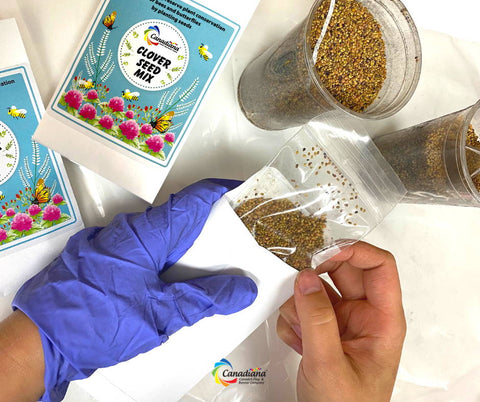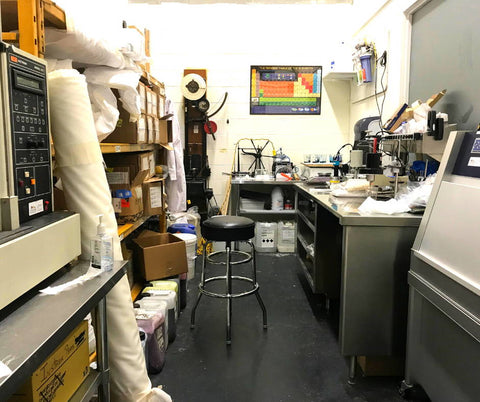At Canadiana Flag, we feel we’re in a unique position to contribute to social and environmental causes. As a small, employee-owned business, we each have a voice in the direction we take. Our teams at Canadiana Flag have a say in what efforts the company should support. This ensures genuine support towards causes we're passionate about.
We thought it would be a good idea to share some of programs and initiatives we are constantly working on to give back to the community. In addition, in hope of inspiring others to do the same and be more aware of what is going on around the world.
Save the Bees!
Bees are essential to the agricultural community and help sustain biodiversity. According to Greenpeace, bees perform 80 percent of all pollination worldwide, and a single colony can pollinate 300 million flowers each day. But it’s not just flowers. Our very survival depends on bees transferring pollen from male to female parts of plants that we eat. In fact, bees are responsible for a third of the food we eat.
Some interesting facts about bees:
- There are 20,000 species of bees in the world.
- A beehive can be home to 50,000 to 80,000 bees at its summer peak.
- It takes nectar from two million flowers to create a pound of honey
Another interesting, but sobering, fact: Bee populations worldwide are under threat from a variety of enemies. Drought, changes in land use, pollution and global warming are contributing to loss of habitat. In the early 2000s, scientists started witnessing entire colonies of bees dying off. This Colony Collapse Disorder (CCD) was eventually pinned primarily on the toxic stew of pesticides and fungicides in use in agriculture.
Canadiana Flag is raising awareness of the plight of bees. We have a pair of our own hives in Ontario’s cottage country. We’re reaching out to our customers—every customer around the holiday season gets a jar of our natural honey from those hives to remind them to keep bees top of mind. In spring, every order contains a bag of mixed clover seeds—red, crimson and white. Clovers are popular among bees and butterflies. We encourage our customers to spread the seeds where they can to attract these life-giving pollinators. This helps out the agricultural community by giving a place for bees and butterflies to feed and nest while they help pollinate the plants. Furthermore, besides providing a humbling Spring activity, this helps with plant conservation. It’s also a spring highlight for our staff to fill these bags from a massive bulk container.
Recommended Read: Canadiana Flag is Proud to Bee Canadian
We Sponsor Children in Haiti
The history of the land that is now known as the Republic of Haiti has been almost uniformly tragic since Christopher Columbus landed at Hispaniola in 1492. It has been one of occupations, indemnities from foreign countries, revolutions, coups-d’etat, massacres, natural disasters and, most recently, a presidential assassination. It is the poorest country in the western hemisphere.
And, as always, the children suffer the most in times of turmoil. Nearly 10 percent of Haitian children don’t live to the age of five; before a 2010 earthquake, from which the country’s infrastructure has still yet to recover, there were 430,000 orphans in the region.
Canadiana Flag is supporting Haiti’s children through a number of charities aimed at alleviating their strife and battling the country’s 40 per cent illiteracy rate.
Canadians have been rightly horrified by the still unfolding developments at residential schools for native Canadian children. Snatched from their homes in an attempt to erode their cultures, they were then subject to obscene levels of discipline and deprivation. Many who died under residential school care were buried in mass graves, with no acknowledgement of their deaths.
Our Every Child Matters flag does not just simply recognize the movement to gain a measure of justice for these children, however belatedly—a portion of proceeds go towards organizations that support Indigenous communities such as the Orange Shirt Society. We decided to produce our Every Child Matters flag in hopes of giving the opportunity for others to spread awareness about the horrific residential school experience.
Purchase an Every Child Matters flag here to show your support towards Indigenous communities. Now available as a car flag!




